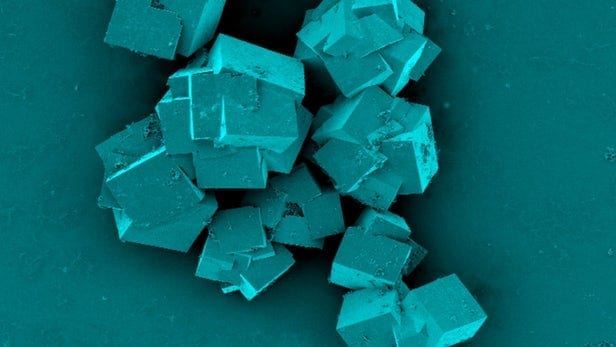via ChemistryViews.org
An international research team has pioneered and patented a new filtration technique that could one day slash lithium extraction times.
The world-first study, published today in the prestigious international journal Nature Materials, presents findings that demonstrate the way in which Metal-Organic Framework (MOF) channels can mimic the filtering function, or ‘ion selectivity’, of biological ion channels embedded within a cell membrane.
Inspired by the precise filtering capabilities of a living cell, the research team has developed a synthetic MOF-based ion channel membrane that is precisely tuned, in both size and chemistry, to filter lithium ions in an ultra-fast, one-directional and highly selective manner.
This discovery, developed by researchers at Monash University, CSIRO, the University of Melbourne and The University of Texas at Austin, opens up the possibility to create a revolutionary filtering technology that could substantially change the way in which lithium-from-brine extraction is undertaken.
This technology is the subject of a worldwide patent application filed in 2019. Energy Exploration Technologies, Inc. (EnergyX) has since executed a worldwide exclusive license to commercialise the technology.
“Based on this new research, we could one day have the capability to produce simple filters that will take hours to extract lithium from brine, rather than several months to years,” said Professor Huanting Wang, co-lead research author and Professor of Chemical Engineering at Monash University.
“Preliminary studies have shown that this technology has a lithium recovery rate of approximately 90 percent – a substantial improvement on 30 percent recovery rate achieved through the current solar evaporation process.”
Professor Benny Freeman from the McKetta Department of Chemical Engineering at The University of Texas at Austin, said: “Thanks to the international, interdisciplinary and collaborative team involved in this research, we are discovering new routes to very selective separation membranes.”
“We are both enthusiastic and hopeful that the strategy outlined in this paper will provide a clear roadmap for resource recovery and low energy water purification of many different molecular species.”
Associate Professor (Jefferson) Zhe Liu from The University of Melbourne said: “The working mechanism of the new MOF-based filtration membrane is particularly interesting, and is a delicate competition between ion partial dehydration and ion affinitive interaction with the functional groups distributed along the MOF nanochannels.
“There is significant potential of designing our MOF-based membrane systems for different types of filtration applications, including for use in lithium-from-brine extraction.”
CSIRO and Monash University Associate Professor Matthew Hill said: “We’re pleased that our international research collaboration has made a breakthrough that could improve the supply of lithium. This is important for enabling electric vehicles and grid integration of renewable energy sources.”
“It’s truly an honour to work with such brilliant scientists at all these organisations,” said Teague Egan, Founder and CEO of EnergyX. “This breakthrough invention will literally change the way lithium is produced and how we power our future.”
The Latest Updates from Bing News & Google News
Go deeper with Bing News on:
Lithium extraction
- Scientists are shaking up lithium extraction with a different kind of chemistry
When people think of chemistry, the image that typically comes to mind is a variety of colored liquids in beakers, flasks, and test tubes in a lab. But in actual practice, chemistry can involve ...
- E3 Lithium Files 2023 Year End Financial Results
ON BEHALF OF THE BOARD OF DIRECTORS Chris Doornbos, President & CEO E3 Lithium Ltd. E3 Lithium is a development company with a total of 16.0 million tonnes of lithium carbonate equivalent (LCE) ...
- ABTC commissions lithium pilot plant
American Battery Technology Company has commissioned its pilot lithium processing plant as it makes plans to construct a commercial-scale lithium refinery at its Tonopah Flats Lithium Project near ...
- Unearthed - A Lithium Treasure Lies Beneath Germany's Heath
Is it the end of dependence? Lithium is one of the most important raw materials of the energy transition – one that Germany has to completely import. Now, scientists are aiming to extract this ...
- Standard Lithium Activates Cutting-Edge Plant, Paves Way For Cleaner Mining
Standard Lithium commissions largest DLE unit in NA, aiming to become sustainable lithium producer. Offers more efficient and eco-friendly extraction method.
Go deeper with Google Headlines on:
Lithium extraction
[google_news title=”” keyword=”lithium extraction” num_posts=”5″ blurb_length=”0″ show_thumb=”left”]
Go deeper with Bing News on:
Lithium
- Scientists are shaking up lithium extraction with a different kind of chemistry
When people think of chemistry, the image that typically comes to mind is a variety of colored liquids in beakers, flasks, and test tubes in a lab. But in actual practice, chemistry can involve ...
- Lithium-ion battery likely caused Franklin house fire
A Williamson County neighborhood is counting blessings and checking their homes after a house fire Thursday night.
- Lithium battery sparks destructive house fire in Franklin
A Franklin family is picking up the pieces after a fire ripped through their home Thursday night, killing two animals and causing serious damage to the structure.
- Lithium Miners News For The Month Of April 2024
Welcome to the April 2024 edition of the lithium miner news. The past month saw lithium prices flat and a very busy month of good news for the lithium producers. We also saw the start of the Beijing ...
- ABTC commissions lithium pilot plant
American Battery Technology Company has commissioned its pilot lithium processing plant as it makes plans to construct a commercial-scale lithium refinery at its Tonopah Flats Lithium Project near ...
Go deeper with Google Headlines on:
Lithium
[google_news title=”” keyword=”lithium” num_posts=”5″ blurb_length=”0″ show_thumb=”left”]











